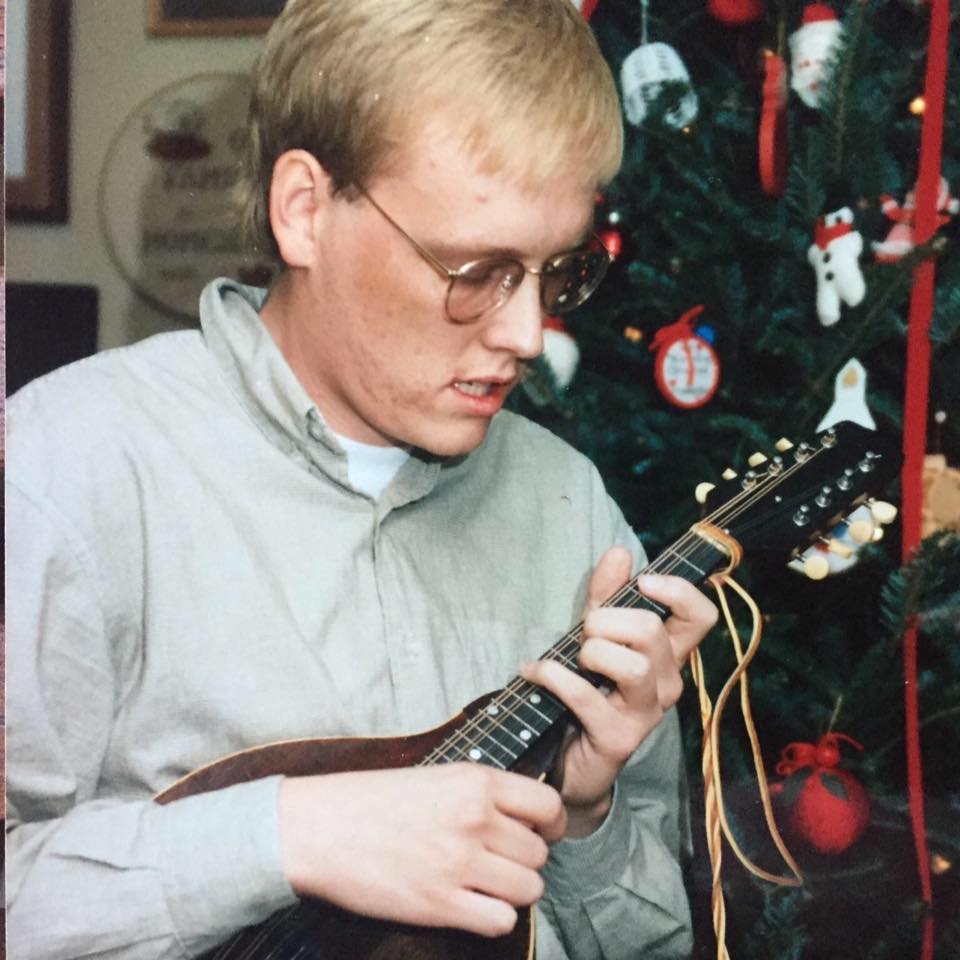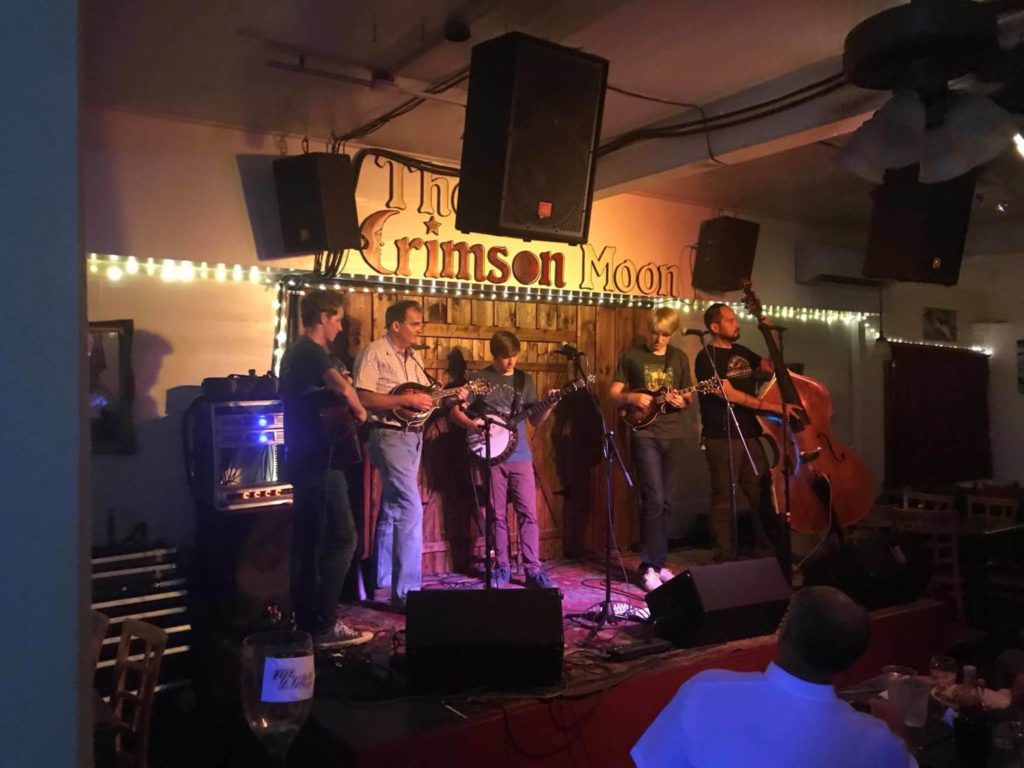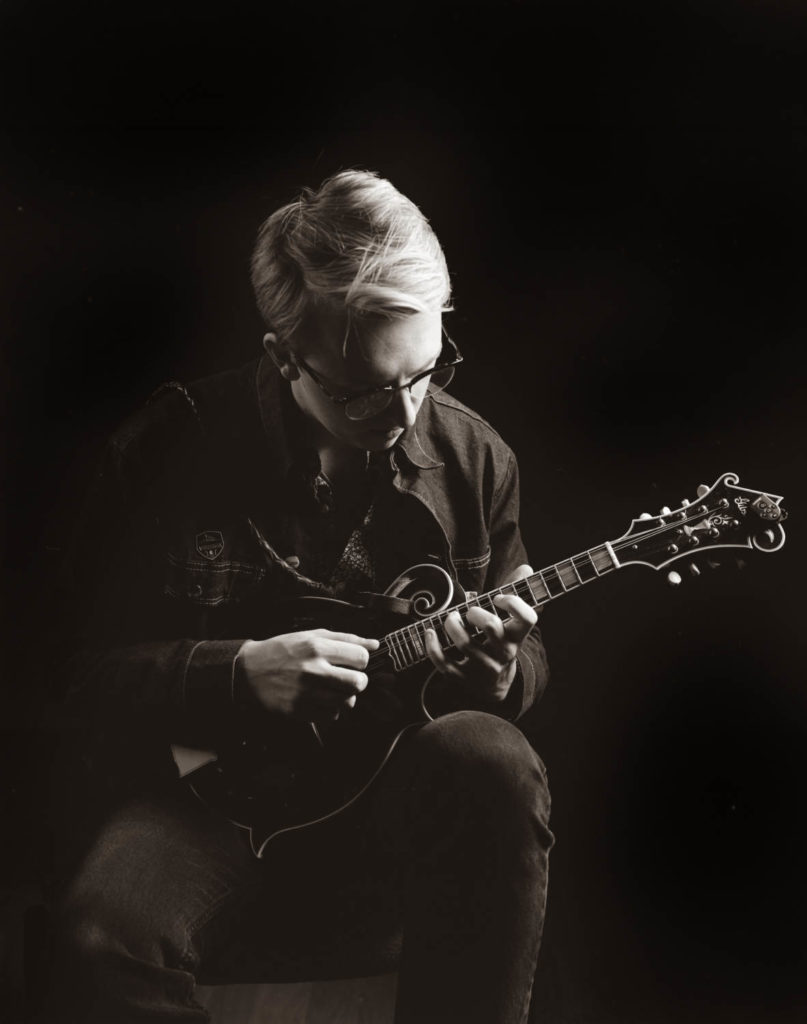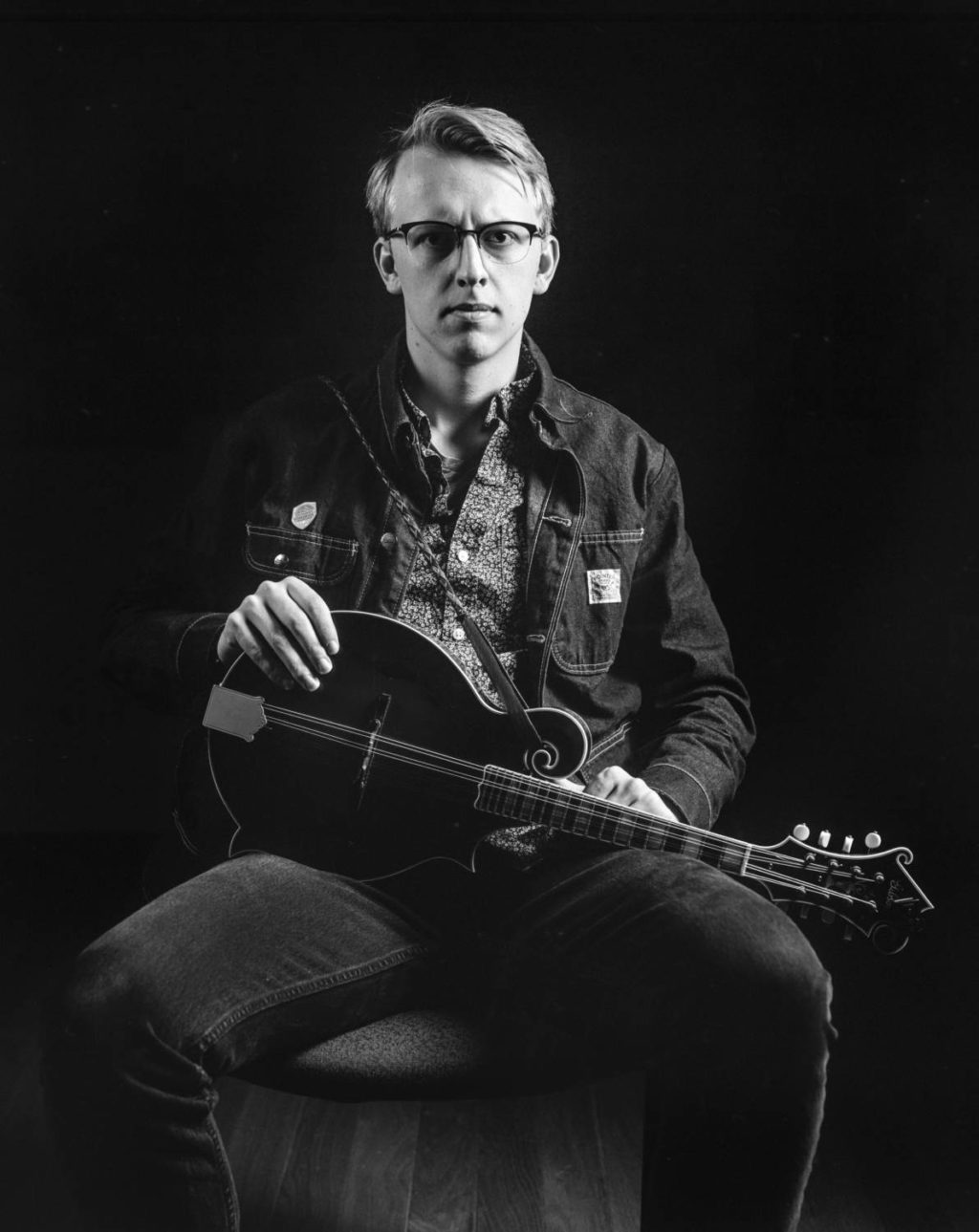Today I’m getting to know more of the story of one of the hardest working musicians I’ve ever met. In the relatively short time that Thomas has been playing mandolin, he’s formed two bands (which he manages), has completed an undergraduate degree from ETSU in Bluegrass Music, and has performed from New York to California. Thomas for those that haven’t heard of you or your music before, tell us who you are, what you do, and where you’re located.
I could say my name is Thomas Cassell. I’m currently based out of Johnson City, TN where I perform on the road with several bands, teach, and am chipping away at a Master’s degree.
JED: Master’s degree? I knew you were studying for an undergraduate degree but this is new! We’ll come back to that. Tell us a little bit about your beginnings. Your origin story, so to speak. How did you get into music, and what made you choose this path over others?
Well, I didn’t really have the same baptism in this industry that many of my peers did. I grew up playing music, sure (drums mostly), and bluegrass was around, but I really didn’t grab onto it until I was 16. I had to do a lot of catching up, which I’m still doing, but this style of music has totally consumed me at this point.
I grew up in the corner of southwestern Virginia (Norton, to be exact), that most folks don’t know exists. We’re closer to 7 other state capitols than our own – yeah, that’s right. That area is often referred to in bluegrass as “Stanley Country,” as it has been the home to the Stanley Brothers, Jim & Jesse, Dock Boggs, and a number of other figures in bluegrass/old-time music. But, I found that while in a historically vibrant place, there weren’t a lot of internal forces pulling me to bluegrass.
I think if you would have handed me a mandolin when I was 6, I would have played it from then on. I grew up watching my uncle Don Cassell play mandolin (and still do), but my first major enthrallment was Sam Bush. Through my dad and uncle, I latched on to Sam as a kid. When I was in the first grade, I took his Peaks of Telluride album to show and tell – surprise, I was the only one who liked it. I remember seeing my 3rd grade teacher at a Sam Band concert in Kingsport, TN around that time, and to this day it still makes me think about how hip she was. Combining this experience with my growing up on the baseball field, Sam’s Wizard of Oz was practically my childhood soundtrack. “Heyyyyyyyy Ozzie!”
When I was around 12 I picked up banjo. It didn’t really stick, but a few years later I was doing a summer Governor’s School at Mountain Empire Community College, and they wouldn’t let me take the mechanical engineering class again (that’s what I wanted to grow up to do) so I signed up for Tyler Hughes’ Old-Time Music course. There I learned how to play clawhammer banjo, which I still do now, though almost exclusively at the house.
Not long after this I got really into listening to the Pizza Tapes. I knew who Tony Rice was (I saw him live when I was maybe 10), but this time around I was totally captivated by the way David Grisman could play these simple melodies on the mandolin and make them sound so beautiful. I’m still captivated by that, as are many.
Anyway, that was pretty much the breaking point. I wanted to get a mandolin but honestly was not very motivated, and it kinda got tucked away in my head. Maybe half a year later, I walked home one day and noticed a mandolin case next to my dad’s dresser (it was a Peter White snakehead copy). I immediately started messing around, and the first thing I figured out was Darlin’ Corey, which I played on banjo. Turns out that my dad borrowed that mandolin from his brother, for himself, as he played some in college and wanted to mess with it again. I bet he didn’t play it for more than 5 minutes the entire time it was in the house. I still feel bad about that, but he doesn’t seem to care – maybe it was all a scheme by the two of them anyway.

It was game on from then, and around that time my dad and I started going to various shows and he helped me look for and eventually buy a decent mandolin of my own.
JED: What kind of mandolin did you end up getting?
It was a Kentucky KM-850, or so I think that’s the official name. I found it in a pawn shop in Pennington Gap, Virginia and got it that same day. It was one of the old Kentuckys, mid 1980’s, and though I’m not sure where it was made, it was very well made, and sounds great. My brother keeps it now.
It seems like the time since I got that mandolin has gone by in 5 minutes. I’ve been able to play with some great bands and musicians (yourself included), get a degree in what I love, and enjoy my life.
JED: Man that is flattering and I’d agree, you’ve surrounded yourself with really talented people. What are your favorite 5 albums, and do they influence your work? If so, in what ways?
My number one album is likely Mirrors of Embarrassment by Col. Bruce Hampton and the Aquarium Rescue Unit. I have still not heard any mandolin playing to this day that matches that of Matt Mundy. Lucky for me, I’ve been able to know him and call him a friend in the last couple of years.
JED: You and Matthew [Davis] showed me that album on a Circus No. 9 run about 2 years ago and it was really something I’d never heard before. Matt Mundy’s mandolin tone is unbelievable on that album. That is fantastic that you’ve gotten to know him. How did you end up meeting him?
I’d kinda heard Matt [Mundy] was around still, and one day I ended up finding him on facebook. I just contacted him then and we hit it off well. Turns out he lives about 30 minutes from some family of mine just north of Atlanta. I was down there a few months later and drove up to meet him and we hung out for the afternoon. Since then he’s come to a few shows and always plays a couple tunes with us.

I’m a huge fan of John Hartford, and while I can’t say that a single album of his is the best, I think Mark Twang is as good as any for representing Hartford’s spirit and view on music. I love the humor of this album, but also the great writing. Reminds me of a Col. Bruce quote, “Never take yourself seriously, but take what you do seriously. There’s nothing more sickening than a serious musician.” Some Mark Twang top picks from me: Let Him Go on Mama, Tater Tate & Alan Munde, and Little Cabin Home on the Hill Waugh Waugh.
One of the first albums that really had a musical impact on me is Live at the Down Home by Newfound Road. Joe Booher’s mandolin playing on there is top notch and was some of the first I attempted to study. I still geek out when I get to play at the Down Home, mostly because of this record.
The Seldom Scene’s Live at the Cellar Door. This is one of the first records my dad turned me onto when I picked up the mandolin. His insistence was that far too many mandolinists ignore John Duffey, which I think is still true. Also, John Starling is one of my top 5 bluegrass vocalists and songwriters. I wish I could have spent time around the both of them.
The self-titled David Grisman Quintet. This is one of only a few albums that at some point, I could play along with every tune. Dawg’s music is still my favorite to study, and he’s just a master of tunes and tone. Seriously, how do you sound that good?
JED: Which part of your music career do you enjoy the most – live performance, recording, writing, etc.?
I’ve found for myself that I need a healthy mix of several outlets. Any of those can be extremely frustrating and draining if you do them too frequently, at least for me.
JED: You know you’re the first person to say that, but I couldn’t agree more.
I do love to tour, play for audiences, and particularly travel, but I also need space and quiet from time to time. I do like recording and the element of playing all kinds of music for all kinds of people in the studio, but man – I like to be able to look out the window sometimes. Studio time drains me more than about anything else. I’ve been writing much more recently than I have in the past, but the process is grueling. Nothing beats having solid original material though, so it is generally worth it.
JED: You make a really good and oft-overlooked point; having original material is usually worth the grind. – What are three musicians today do you think are underrated or deserve more notoriety for their art?
Josh Gooding is probably my favorite mandolin player out there right now. I don’t know anyone else who has studied their vernacular as deeply and is as great of an improviser in it as he is.
Drew Matulich is one of my best friends and a great musician to boot. I don’t think I know a more “honest” musician than him – someone who is that good purely because they enjoy doing it. I knew Drew for a couple of years as a mandolin player, but once I went to his house and heard him play guitar. We’ve been playing together since and play fiddle tunes, bluegrass standards, dawg tunes, everything, and I never have a better time than when I play with him.
Ed Snodderly is one of the greatest songwriters in the world. You’ve heard his songs, but you may not have heard of him. His album Record Shop I’ve listened to as much as anything in the past few years.

JED: Tell us a little bit about your current rig – what does your “rig” consist of? What instrument(s) do you play, pedals, mics, etc.?
I play a 2016 Gibson Sam Bush Model mandolin. It’s the only one I use.
I still have a firm opinion that nothing will beat a microphone on an instrument – so I carry an emergency SM57 in my mandolin case. However, I do recognize that sometimes there are different sound/performance needs for different groups, so it’s important to adapt.
With Circus No. 9 I use a K&K pickup and a Shure beta 97c microphone blended through a Grace Design Felix. I also use a few pedals that usually rotate, but a few are the Source Audio Nemesis Delay, EHX Pitch Fork, EHX Freeze, and anything else I may have sitting around in my electric junk box. Any other plug in gig, I usually just take the DI and leave the pedals at home.
With the Thomas Cassell Band we use a center large diaphragm condenser (usually an sE T2) and a few dynamic mics for wings.
Oh yeah, and D’addario strings. I’ve tried the new XTs recently but normally I just stick to the nickel bronze wound. They sound like my instrument the most of any I’ve tried.
JED: If you were given an unlimited budget for an album production to record your dream album, what would it look like?
It seems like the better the album, the less money (at least to a point). Not in production, but in what musicians can get paid and general comfort, etc. I once heard a story of Bela Fleck only being able to pay Mark O’Connor $25 for a session once. So, first and foremost I’d get the other musicians what they really deserve.
Something I think is important but often unavailable because of funds, is to demo an entire record before the actual sessions. It happens in larger genres but not as frequently in bluegrass.
I don’t know that I’ve ever been a part of a project that wasn’t budgeting time in the studio sometime, which generally leads to a rushed and nervous environment. Being able to have unlimited time would make a difference.
JED: You’re the first person to mention demo-ing an album. That is a neat idea and I think it’d allow you to really hammer out solid arrangements. I agree, time constraints don’t facilitate relaxed playing. Do you know who you’d want to play on it? Who you’d have mix and master it? Who’d cater? 😀
As great of players as money could buy, I’d still like to play with people I enjoy hanging with. For me, that impacts the music as much as anything. For instance, I’m about to do a Cassell Brothers album with my brother Will and Hunter Berry is going to help produce/play fiddle. We hang out with Hunter fairly regularly, and we chose him for this mostly because we have a great time being around him. He just also happens to be a great musician.
I’m the least picky with the audio side of things. That said, I know when I don’t like something, and there are plenty of recordings I don’t like (I’ll spare names). Though I haven’t worked with him personally, I think everything Dave Sinko does sounds great. Ben Surrat is another name I’d toss in there.
JED: What is your favorite album or recording that you’ve made to date?
I don’t know that I’ve had as much fun working on anything as the Voyager album I did a couple of years ago. The guys I had on that are just a great hang, and even after we were drained from multiple 8 hour studio days we still had a good time hanging out each night. I’m a firm believer that a bad hang leads to bad music.
JED: Great point man. I agree.What are you currently working on?
Last weekend I finished a session for Tray Wellington’s banjo record. Really cool instrumentals and we had a great time in the studio.
JED: Johnny Calamari recorded on that album! He’s also in your band isn’t he?
He is. The “Thomas Cassell Band” is a moderately rotating cast, but Johnny plays the majority of our dates.
As mentioned, this month I’m starting an album with my brother and some of our best friends, and we’re going to call it the Cassell Brothers. I don’t know how much performing we’ll do, but this project is something we’ve wanted to do for a while.
And somewhere in here I’ve got to finish my Master’s.
JED: Man since you brought that up let’s circle back to that – I knew you were completing your bachelor’s degree but when did the master’s degree come into the picture?
As I finished my undergrad, I was slowly persuaded into a masters program by my friend and former roommate Diggs Derusha. It’s a Master of Arts degree in Appalachian Studies at East Tennessee State University. My thesis writing is on the 1980’s era of bluegrass. (focus: Johnson Mountain Boys, Hot Rize, Bluegrass Album Band, etc.)
JED: Well man it sounds like the future is really looking bright for you. Thomas I wish you the best of luck finishing your degree and hope you’ll stop in again soon. Keep us updated on the Cassell Brothers release and say hello to Will for me.
Thomas’ website, Instagram, and Twitter. Article photo by Ben Bateson.

